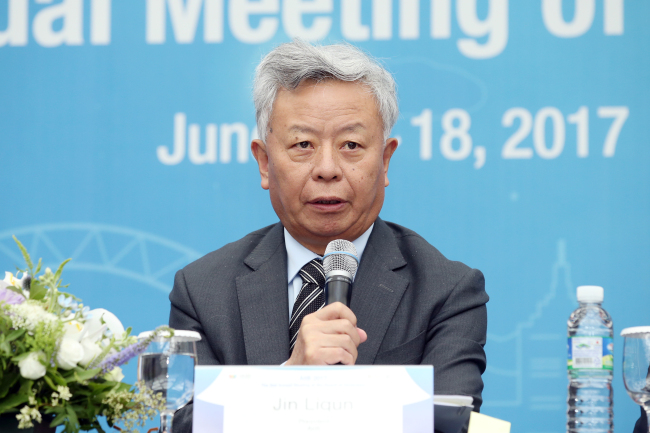SEOGWIPO, Jeju Province -- The Asian Infrastructure Investment Bank may finance infrastructure projects for North Korea, if its board of directors agree to it, the head of the China-led multinational lender said Saturday.
According to the bank’s articles of agreement, it will invest in its member countries, and whether there is any need or necessity to invest in a nonmember country is the decision of the board of governors, said AIIB President Jin Liqun at a press conference held to wrap up the second annual meeting of the bank’s board of governors on Jeju Island.
North Korea is not a member of the bank.
The AIIB chief was answering to a question by The Korea Herald on whether the lender had any plan to provide loans for infrastructure projects in the North, including South Korean leader Moon Jae-in’s proposal of linking the South and North by a railroad.
Jin’s positive remarks were seen as the bank being open toward possible economic projects between the two Koreas.
 |
AIIB President Jin Liqun delivers a speech at the opening ceremony of the second annual meeting of governors at the International Convention Center in Seogwipo, Jeju Island, Friday. (Yonhap) |
Founded in January 2016, the AIIB has so far approved loans for 16 infrastructure projects in nine countries, totaling $2.49 billion. One of the projects is to construct a hydropower plant in Georgia with the participation of Korea Water Resources Corp. and Korea Development Bank.
Jin emphasized long-term cooperation between the bank and South Korea as one of the major achievements of the two-day forum.
“We are very much honored to have the President Moon to attend our opening ceremony and making an excellent speech which was very much inspiring and providing us guidance in the way we move forward, to the way Korea and (the) AIIB can work together,” Jin said.
He also highlighted how cooperation was discussed in many areas with Kim Dong-yeon, South Korea’s deputy prime minister and finance minister, including how Korean nationals could be encouraged to work in the AIIB; how Korean companies could be encouraged to participate in international competitive biddings; and how to encourage Korean institutions, the Korea Development Bank, Korean Eximbank and other private sector companies to work together.
Korea is currently the fifth-largest shareholder of the AIIB with a 4.06 percent stake worth 4 trillion won ($3.4 billion). Kim Yoon-kyung, director general of international financial cooperation at the Ministry of Strategy and Finance is serving as a director at AIIB with five working-level officials.
The meeting in Jeju was the institution’s first overseas event outside China. South Korea, the host country, has a significant role in the China-led bank, Jin said.
In-depth discussions about sustainable infrastructure were made at 16 sideline seminars for private sector businesses, financial institutions and academic professionals over the two days. More than 2,000 participants including ministerial-level government officials from 77 countries, chiefs of financial institutions, business leaders and infrastructure experts attended the event.
“We focused on sustainable infra, which is the key to green growth in Asia,” Jin said. “We’ll help members’ transitions to a low-carbon future by helping them reach the limit under the Paris agreement.”
Some say the AIIB’s move toward sustainability takes aim at the US’ withdrawal from the Paris climate accord. In 2015, the US had fiercely opposed establishing the Asian version of the World Bank. It also declined to join the institution. Japan, a leading country of the Asian Development Bank, is not an AIIB member either.
“We are very pleased to have (the) 80 members of this bank. This indicates the confidence in the governance and the management of this institution, and also that all of these members are very much committed to working together to improve the livelihoods of our people,” Jin said.
“To keep the economies growing on a sustainable basis while addressing environmental and climate change challenges, the bank will remain open. The door is always open.”
The meeting in Jeju ended with three new members -- Tonga, Argentina and Madagascar -- joining the AIIB, bringing its number of members to 80.
By Song Su-hyun (
song@heraldcorp.com) and Won Ho-jung(
hjwon@heraldcorp.com)






![[Exclusive] Hyundai Mobis eyes closer ties with BYD](http://res.heraldm.com/phpwas/restmb_idxmake.php?idx=644&simg=/content/image/2024/11/25/20241125050044_0.jpg)
![[Herald Review] 'Gangnam B-Side' combines social realism with masterful suspense, performance](http://res.heraldm.com/phpwas/restmb_idxmake.php?idx=644&simg=/content/image/2024/11/25/20241125050072_0.jpg)
